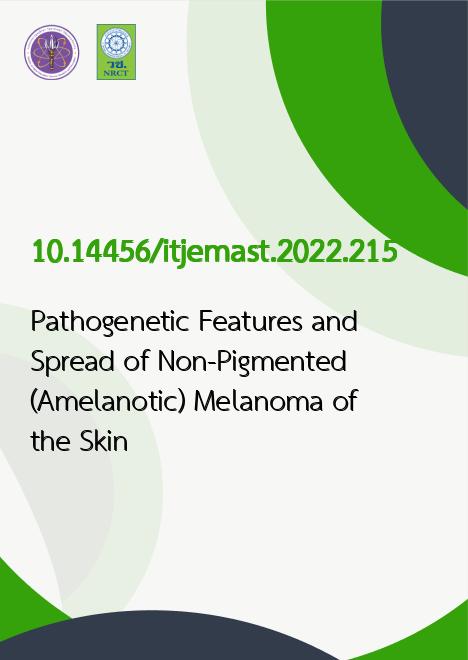
|
Pathogenetic Features and Spread of Non-Pigmented (Amelanotic) Melanoma of the Skin |
|---|---|
| รหัสดีโอไอ | |
| Creator | Tagir Magometovich Nalgiev, Fatima Khamzatovna Dagaeva, Zarina Olegovna Khubetsova, Abdulla Saydalievich Majidov, Busana Mansurovna Dadasheva, Madina Tamerlanovna Kadieva, Igor Alexandrovich Kostylev, Madina Yusupovna Latyrova, Abdusaid Abdumutalibovich Kurbanov, Silviya Grayrovna Arzumanyan |
| Title | Pathogenetic Features and Spread of Non-Pigmented (Amelanotic) Melanoma of the Skin |
| Contributor | - |
| Publisher | TuEngr Group |
| Publication Year | 2565 |
| Journal Title | International Transaction Journal of Engineering, Management, & Applied Sciences & Technologies |
| Journal Vol. | 13 |
| Journal No. | 11 |
| Page no. | 13A11E: 1-9 |
| Keyword | amelanotic melanoma, dermatoscopy, melanoma, pathogenesis, epidemiology, epiluminescent microscopy, melanocytic skin lesion, non-melanocytic skin lesion |
| URL Website | http://TuEngr.com/Vol13-11.html |
| Website title | ITJEMAST V13(11) 2022 @ TuEngr.com |
| ISSN | 2228-9860 |
| Abstract | Amelanotic malignant melanoma (non-pigmented melanoma) is a subtype of skin melanoma with little or no pigment on visual examination and is one of the most difficult-to-diagnose clinical conditions. It can mimic benign and malignant variants of both melanocytic and non-melanocytic lesions. Amelanotic melanoma (AM) accounts for 1.8 to 8.1% of all melanomas. The exact incidence is difficult to calculate since the term pigmented melanoma is often used to clinically describe any melanoma that is only partially devoid of pigment. True non-pigmented melanoma is rare, i.e. it does not produce any discernible eumelanin (so-called pure AM), there are also melanomas producing low levels of eumelanin (i.e. hypomelanous melanomas). Such melanomas may seem pigmented. From a clinical point of view, the diagnosis of non-pigmented melanoma is a difficult task for the reason that the clinical and diagnostic signs that are usually associated with melanomas (asymmetry, uneven borders and variegation of color) are rarely present in AM. Thus, in about 50% of cases, the differential diagnosis varies from inflammatory to benign neoplastic formations, which leads to late diagnosis. |